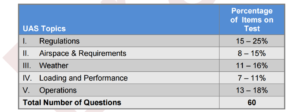Flying Your Drone – New Regulation
FAA PART 107 UAS AERONAUTICAL KNOWLEDGE TEST: EVERYTHING YOU NEED TO KNOW!
The Federal Aviation Administration announced today that drone operators will have to pass a UAS aeronautical knowledge test as one of the requirements for legally flying drones commercially.
Here’s a rundown of the entire announcement of its long-awaited Part 107 ruling.
Among the requirements to fly a UAS commercially include flying below 400 feet, flying only during daytime and flying less than 100 miles per hour. But the standout requirement is that commercial drone operators will need to take a written, in-person, drone-specific, aeronautical knowledge test.
“It’s a great idea,” said Logan Campbell, CEO of drone consulting firm Aerotas. “It forces people to understand how to keep the national airspace safe, which is really what the FAA cares about most.”
Drone operators with existing Part 61 pilot certificates can bypass the in-person, written exam and instead take an online course. But for drone operators without that, they’ll have to take the test at an FAA-approved knowledge testing center.
The FAA has released a drafted document of Unmanned Aircraft Systems Airman Certification Standards, outlining what you can tentatively expect from the test. Here’s the tentative information we know for now:
Where you can take the FAA’s UAS aeronautical knowledge test:
The test can be taken at one of the 696 testing centers in the United States. Here’s a list of locations where you can take the aeronautical knowledge test. Applicants need to schedule the testing appointment in advance and bring a government-issued photo ID.
What are the expected areas this commercial drone test will cover?
The FAA’s draft says test areas include:
- Applicable regulations relating to small unmanned aircraft system rating privileges, limitations, and flight operation
- Airspace classification and operating requirements, and flight restrictions affecting small unmanned aircraft operation
- Aviation weather sources and effects of weather on small unmanned aircraft performance
- Small unmanned aircraft loading and performance
- Emergency procedures
- Crew resource management
- Radio communication procedures
- Determining the performance of small unmanned aircraft
- Physiological effects of drugs and alcohol
- Aeronautical decision-making and judgment
- Airport operations
- Maintenance and pre-flight inspection procedures
Get more in-depth information about each of these topics here.
How do I study for the UAS aeronautical knowledge test?
The FAA released its Part 107 UAS online training course. Though it is intended for Part 61 Pilot Certificate holders, anyone, including non-pilots, can register and take for free. Read more about the training course here.
SWhile the test will include a mix of both drone-specific and general manned aircraft questions, some readers have also pointed out that the Pilot’s Handbook of Aeronautical Knowledge, which is the official FAA handbook, is a good place to start studying for more general airspace knowledge. You can pick up your own copy here.
How much will the aeronautical drone test cost?
The FAA estimates the out-of-pocket cost for an individual to become a certified remote pilot with a small UAS rating would be $150, less than any other airman certification that allows for non-recreational operations in the national airspace.
When will I be able to take the test?
Members of the public will be able to take the knowledge test at testing centers on the effective date of the Small UAS Rule in August 2016, an FAA spokesperson told Drone Girl.
How will the test be formatted?
The FAA’s draft says the UAS aeronautical knowledge test is a set of 60 multiple choice questions with a single correct response for each one, according to the FAA’s draft. Each test question is independent of the other questions, so a correct response to one does not influence the response of another. Here’s the breakdown of questions by topic:
What happens if I fail the FAA’s aeronautical knowledge test?
No sweat! You may not retake the knowledge test for 14 calendar days from the date of the previous failure, so use that time to relax and refresh on the parts you are unsure of. After two weeks, you can retest. You don’t even have to tell your teachers what happened — no instructor endorsement or other form of written authorization is required to retest.

